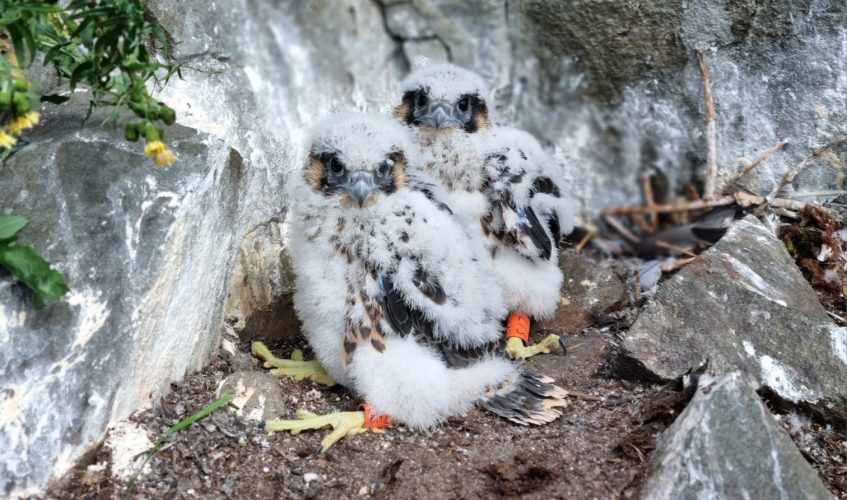Two men have been sentenced with community payback orders after pleading guilty to a series of wildlife crime related offences involving peregrine falcons in the south of Scotland.
Timothy Hall, 48 was given 220 hours, and Lewis Hall, 23, was given 150 hours community payback orders today at Jedburgh Sheriff Court. Both have been banned from keeping birds of prey for 5 years.
They admitted charges relating to 22 peregrine falcons, including being involved in the illegal sale of the protected species at Selkirk Sheriff Court on Monday, 11 December, 2023.
Timothy Hall also pleaded guilty to charges relating to firearms and animal welfare offences.
The ground breaking investigation led by Police Scotland was launched in 2021 and during a search of a property in Lamberton, Berwick-upon-Tweed, seven chicks were discovered as well as a number of other birds of prey.
While it is legal to sell captive-bred peregrines, possessing or selling wild birds is not.
To confirm the chicks were wild a new innovative DNA tactic was introduced which definitively established that they had not been bred in captivity, even linking some of them to wild adult peregrine falcons known to nest in the south of Scotland.
The investigation spanned two and a half years and through extensive enquiries Police Scotland was able to trace the sale of a number of peregrines to UK establishments trading in the birds and confirmed some had been exported overseas.
Throughout the investigation a range of partners provided invaluable contributions and expertise including the Scottish SPCA, the UK National Wildlife Crime Unit (NWCU), the Scottish Raptor Study Group, Science and Advice for Scottish Agriculture (SASA) and COPFS.
Police Scotland also worked closely with the Animal and Plant Health Agency (APHA) to improve processes and procedures relating to illegal wildlife trade to prevent people engaging in this type of criminality.
Detective Superintendent Bryan Burns said: “The sale of peregrine falcons has become an extremely lucrative business which Timothy and Lewis Hall exploited for their own financial gain.
“If their illegal activities had continued unchallenged, this would have had a massive impact on the population of young birds, and had the potential to wipe out the entire population of peregrine falcons in the south of Scotland.
“This case has been a monumental effort by Detective Constable Steven Irvine who led the investigation and was determined to bring the perpetrators to justice, going into meticulous detail to unravel the true extent of the criminality involved.
“These convictions would not have been possible without the incredible support from the partner agencies involved who all played a vital part in the investigation.”
Assistant Chief Constable for Major Crime, Public Protection and Local Crime, ACC Bex Smith, added: “This case not only has huge ramifications locally but also across the UK and worldwide and shows that Police Scotland is at the forefront of tackling illegal wildlife trade, working with our partners to use new and ground breaking forensic techniques.
“Wildlife crime remains a key priority for the Service and we will continue to use all resources at our disposal to put a stop to this illegal activity.”
Chief Inspector Kevin Kelly, head of the UK National Wildlife Crime Unit said: “This is part of the largest wildlife crime investigation in UK history, showing the illegal wildlife trade is a thriving business for criminals.
“The UK is home to some of the rarest birds of prey in the world, some of these are being taken and laundered in the legal falconry trade bringing lucrative returns for criminals and having a direct impact on the current nature crisis. The NWCU is committed to tackling this.”
Dr Lucy Webster from Science and Advice for Scottish Agriculture (SASA), part of the Scottish Government, led on the forensic work.
She said: “This is the first case to use our new forensic DNA method to test whether documented breeding records for Peregrine Falcons are true or false. However, we went beyond establishing false breeding records here, and also identified family links to several wild Peregrine nests. This powerful method will continue to support investigations and combat the illegal trade of wild Peregrines in the UK and beyond.”
Anyone with information or concerns about wildlife crime in their area can contact Police Scotland on 101.





